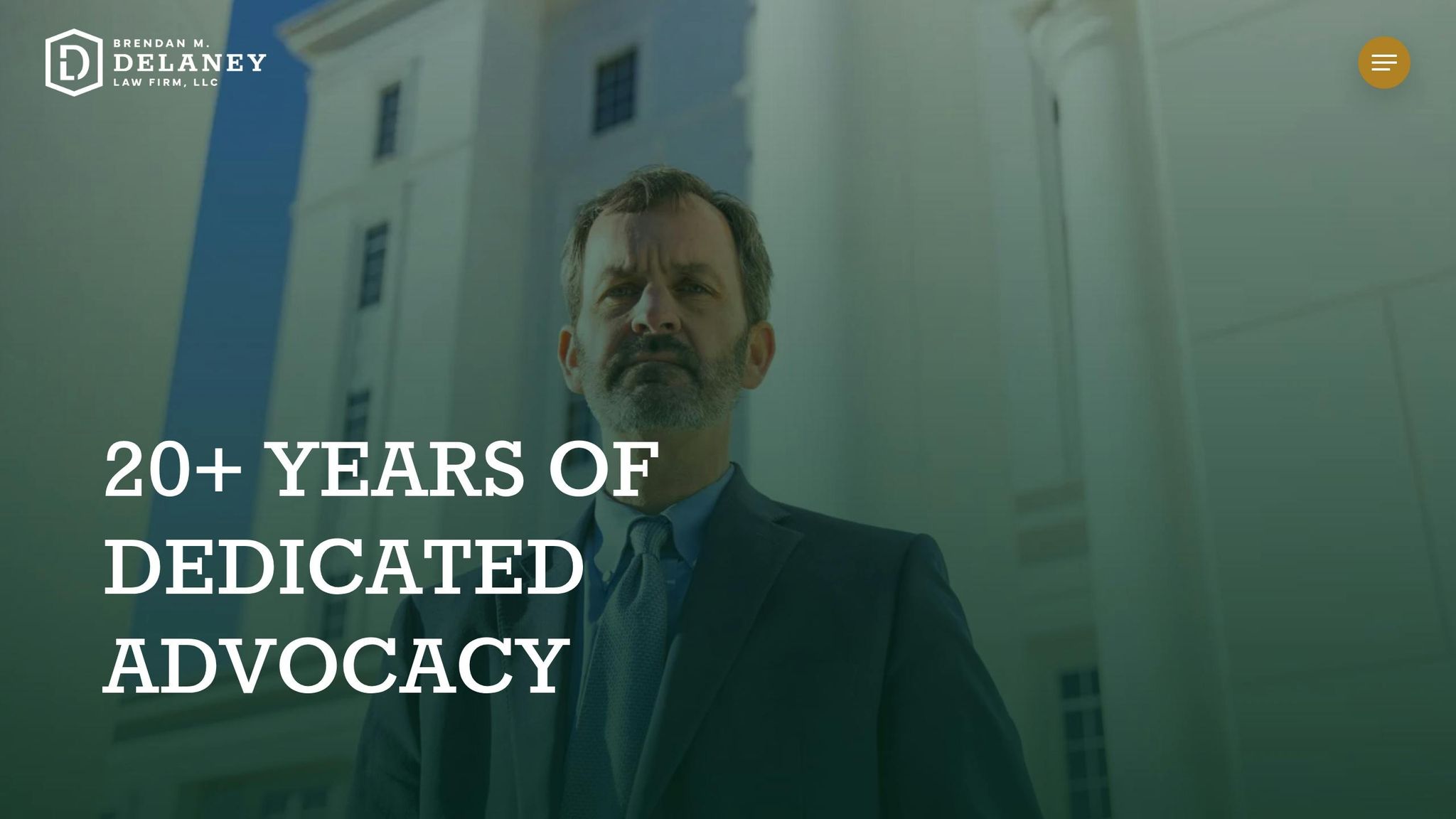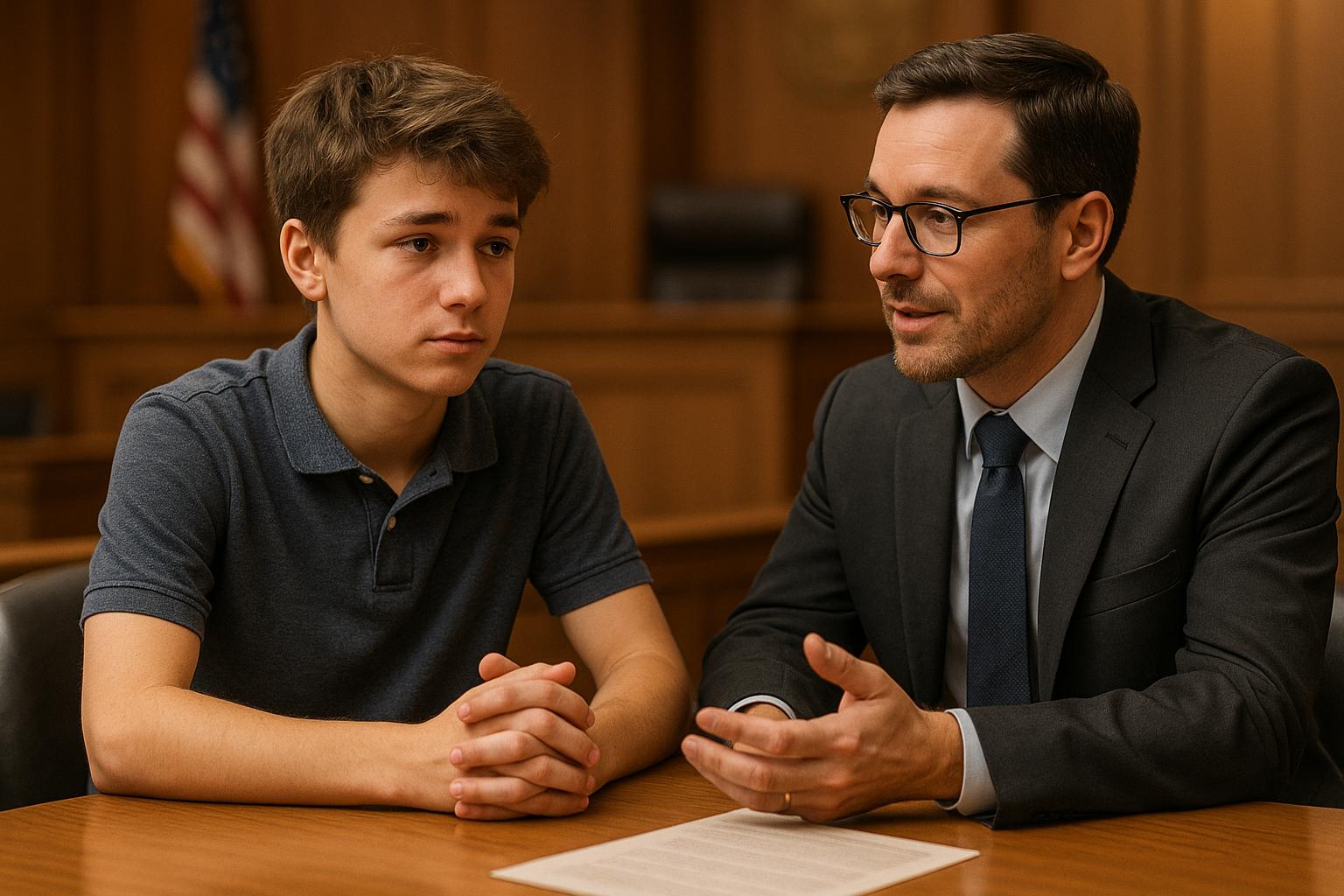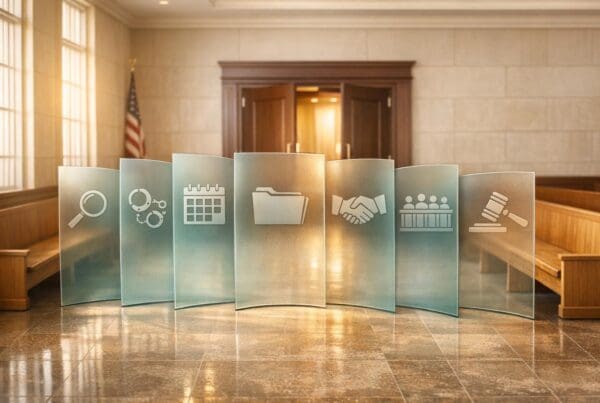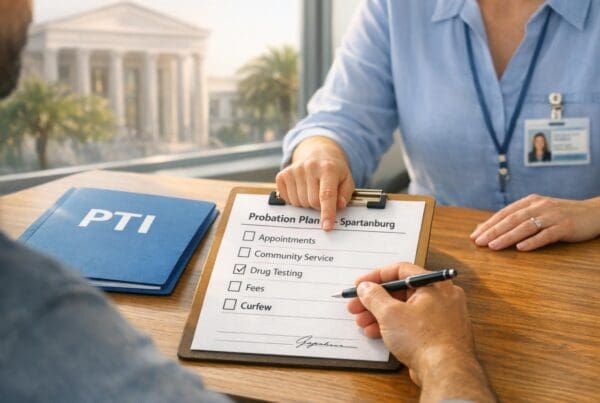Juveniles facing criminal charges need strong legal representation to protect their rights and future. While the juvenile justice system prioritizes rehabilitation over punishment, navigating it can be complex and overwhelming for young people and their families. Without proper defense, juveniles risk severe consequences like permanent records, disrupted education, and even being tried as adults. Here’s why legal support is crucial:
- Juvenile records can impact college admissions, job opportunities, and housing.
- Poor representation increases the risk of harsher penalties or adult court transfers.
- Rehabilitation-focused outcomes like probation or diversion programs are often available but require skilled advocacy.
- Legal counsel ensures rights are upheld and helps secure favorable outcomes.
The stakes are high, but with experienced legal defense, juveniles have a better chance at a second chance and a brighter future.
Juvenile Law in South Carolina
South Carolina’s juvenile justice system, overseen by Family Court for offenders aged 11–17, emphasizes development and rehabilitation rather than punishment. Children under the age of 11 cannot be prosecuted for crimes in the state. This framework reflects a commitment to addressing the unique needs of young offenders, focusing on their potential for growth and positive change.
The system operates on the understanding that juveniles differ significantly from adults in terms of development and decision-making capacity. This perspective influences every stage of the process, from arrest to resolution.
Rehabilitation vs. Punishment
In South Carolina, the juvenile justice system prioritizes rehabilitation over punitive measures. According to the Department of Juvenile Justice (DJJ), their mission centers on prevention and rehabilitation.
This approach often results in probation being favored over detention for most juvenile offenders. Recognizing the psychological and developmental differences between minors and adults, the system aims to support young people’s ability to change and grow. Programs offered by the DJJ include education, vocational training, and mental health counseling, all designed to help minors gain the skills and maturity needed to avoid future offenses.
The system’s ultimate goal is not just to address the immediate offense but to reintegrate young offenders into society as responsible, productive individuals. It seeks to balance rehabilitation with the need to protect public safety and respect victims’ rights.
| Adult Court | Juvenile Court |
|---|---|
| Focus on punishment and accountability | Emphasis on rehabilitation and future potential |
| Public proceedings and records | Private proceedings with limited public access |
| Right to a jury trial | Judge-only adjudication |
| Determination of guilt or innocence | Delinquent or not delinquent finding |
| Standard criminal penalties | Probation, counseling, or community programs |
These differences highlight the unique procedures and priorities of South Carolina’s juvenile justice system.
How Delinquency Proceedings Work
South Carolina’s juvenile delinquency proceedings reflect the system’s rehabilitative focus, with distinct and streamlined processes. A youth typically enters the system through a referral to the Department of Juvenile Justice, which may come from law enforcement, solicitors, or schools.
When law enforcement takes a juvenile into custody, the child is either released to a guardian or detained at a juvenile detention center. If detained, a hearing must occur within 48 hours to determine whether the youth should remain in detention or be released.
Unlike adult criminal cases, juveniles face a "petition" instead of an indictment. The equivalent of a trial is called an "adjudication", where the court determines whether the youth committed the offense. Instead of being found “guilty” or “not guilty,” juveniles are adjudicated delinquent or not delinquent.
Parental involvement is a key aspect of juvenile proceedings. Parents or guardians are notified and required to attend hearings, a marked difference from adult court, where family members have no formal role.
Juvenile proceedings are closed to the public, ensuring privacy for the young individual and shielding them from potential stigma that could impact their future opportunities. After the Department of Juvenile Justice makes recommendations to the solicitor, several outcomes are possible: the case may be dismissed, the youth may be diverted to a program, or formal prosecution may proceed. For non-violent offenses, arbitration serves as a common diversion option, offering an alternative to traditional court proceedings.
If adjudicated delinquent, the Family Court judge determines consequences. These can range from probation, restitution, and community programs to placement in a secure DJJ facility. Juvenile detention can last up to 90 days per offense, or, in some cases, until the individual turns 22.
Importantly, if a juvenile is not found delinquent, their records are expunged, unless a disqualifying factor exists. This protection ensures that unsuccessful prosecutions don’t hinder a young person’s future.
Despite these differences, the juvenile system applies the same burden of proof as adult court: beyond a reasonable doubt. Juveniles also retain many legal rights, such as confronting witnesses and entering plea deals, though they do not have the right to a jury trial.
Risks of Poor Legal Representation
When juveniles lack proper legal representation, the consequences can be life-altering, with effects that ripple far into their future. Families often underestimate the gravity of these situations, but decisions made during this critical time can shape a young person’s entire trajectory.
One troubling statistic highlights the issue: in some jurisdictions, 80 to 90% of juveniles waive their right to an attorney. This often happens because they want to resolve matters quickly or believe the juvenile system will treat them leniently regardless of representation. However, this assumption can lead to devastating outcomes. The Supreme Court, in Kent v. United States, underscored the importance of legal counsel for juveniles:
"The juvenile needs the assistance of counsel to cope with problems of law, to make skilled inquiry into the facts, to insist upon regularity of the proceedings, and to ascertain whether he has a defense and to prepare and submit it."
Without skilled legal guidance, juveniles are at risk of harsher penalties, transfers to adult court, and lasting damage to their records. The financial strain of such outcomes can also weigh heavily on families. Research shows that youth with justice-related debts are more likely to re-offend compared to their debt-free peers. These risks extend far beyond the courtroom, affecting education, employment, and future opportunities.
How Juvenile Records Affect Your Future
In many cases, inadequate legal representation means juvenile records remain unsealed, leaving a lasting mark that could have been avoided through proper legal action, such as sealing or expungement. This failure directly impacts a young person’s future, as a record that should have been protected can instead block opportunities.
The educational consequences are particularly severe. A 2008 study revealed that teens incarcerated before age 17 were 26% less likely to graduate from high school. Similarly, youth placed in detention facilities experienced a 13% to 31% drop in their likelihood of graduating.
Unsealed juvenile records can also surface during background checks, creating obstacles for young adults trying to find jobs. Lourdes Rosado, Associate Director of Juvenile Law Center, highlights the issue:
"The juvenile justice system is intended to rehabilitate youth and prepare them for a productive future, yet our mishandling of juvenile records creates a paper trail that can lead to failure."
The problem doesn’t end there. Without proper management of records, recidivism becomes a significant concern. Between 70% and 80% of youth released from correctional facilities are rearrested within two to three years. Long-term studies paint an even starker picture: 89% of boys and 81% of girls released from state youth correctional facilities were arrested as adults by age 28.
Riya Saha Shah, a Staff Attorney at Juvenile Law Center, explains the broader impact:
"Retention of juvenile records does little to improve public safety but creates significant barriers to success for youth who are trying to move beyond the mistakes they made as a kid. Permanent, open records are like a ball and chain that prevents youth from becoming productive adults, reducing opportunities for employment, eroding the tax base and can lead to increased recidivism due to reduced job prospects."
When Cases Move to Adult Court
Poor legal representation also increases the likelihood of a case being transferred to adult court, where the stakes are much higher. While less than 2% of formal juvenile delinquency cases were judicially waived each year between 1988 and 1992, the outcomes for those transferred are often severe and life-changing.
Experienced attorneys play a vital role in challenging these transfers. They argue against transfer criteria, emphasize the juvenile’s potential for rehabilitation, and present mitigating factors that support keeping the case in juvenile court. Without such advocacy, juveniles are left vulnerable to adult prosecution and its harsh consequences.
For example, nonviolent offenders made up 66% of juveniles transferred to adult court in 1992. Once in the adult system, these youth face greater risks. Studies show that juveniles prosecuted as adults are more likely to re-offend and commit more serious crimes upon release compared to those adjudicated in juvenile court. Additionally, youth in adult facilities face alarming dangers: they are five times more likely to be sexually assaulted, twice as likely to be beaten by staff, and 50% more likely to be attacked with a weapon than those in juvenile facilities.
The juvenile system is designed to focus on rehabilitation, offering counseling, education, and support services tailored to young people. But once a case is moved to adult court, that rehabilitative focus disappears. Instead, juveniles face the same punitive measures as adults, and an adult court conviction leaves a permanent mark on their record, affecting everything from college admissions to job prospects and housing opportunities.
Adding to the burden, fines and fees imposed on juveniles can destabilize families financially and increase the likelihood of recidivism. Ironically, the cost of collecting these fines often exceeds the revenue they generate. This highlights the critical need for skilled legal defense to safeguard a juvenile’s future and prevent unnecessary hardships.
Legal Approaches for Common Juvenile Offenses
Juvenile offenses come with serious consequences, making it crucial to address these cases with strategies tailored to the specific needs of young individuals. In South Carolina, navigating the juvenile justice system effectively requires a deep understanding of the charges and available legal options. The goal is to achieve outcomes that prioritize rehabilitation over punishment, and skilled legal representation plays a critical role in this process.
Common Juvenile Offenses
In South Carolina, individuals under 18 can face a range of charges that may leave a lasting impact on their futures. These offenses often include vandalism, assault, underage drinking, shoplifting, drug possession, curfew violations, truancy, and running away from home. While these actions can result in serious legal consequences, the stakes are even higher for juveniles aged 16 or older. In some cases, they may face felony charges and could even be tried as adults. This underscores the importance of seeking alternative approaches that focus on rehabilitation rather than punishment.
Alternatives to Traditional Penalties
South Carolina’s juvenile justice system places a strong emphasis on rehabilitation, offering several alternatives to traditional sentencing. Probation is one of the most common outcomes for juvenile offenders. Additionally, diversion programs provide opportunities for eligible juveniles to avoid formal adjudication. These programs often include community service, counseling, or educational initiatives, allowing young offenders to address their actions while keeping their records clean. For substance-related offenses, options like drug treatment programs and community service aim to address the root causes of the behavior.
Each case is unique, and having experienced legal representation is crucial to navigating these alternatives. A skilled attorney can ensure that the juvenile’s individual circumstances are fully considered, helping to secure outcomes that support their growth and rehabilitation within the justice system.
sbb-itb-ce0cbb0
The Importance of Experienced Legal Representation
When a juvenile is confronted with criminal charges, the stakes couldn’t be higher. The outcomes of these cases can ripple through their entire lives, influencing education, career opportunities, and more. That’s why having strong legal representation isn’t just a good idea – it’s crucial to safeguarding a young person’s rights and achieving the best possible result. This ties directly to the juvenile justice system’s focus on rehabilitation, as discussed earlier.
Protecting Juvenile Rights
While juveniles are entitled to the same constitutional protections as adults, they often lack the knowledge or ability to assert these rights effectively. Experienced defense attorneys ensure these protections are upheld. The Supreme Court has emphasized the importance of providing juveniles with basic constitutional safeguards.
"The condition of being a boy does not justify a kangaroo court." – In re Gault
An experienced attorney plays a pivotal role throughout the legal process. They investigate the alleged offense, scrutinize police conduct for potential violations, and review all evidence with a critical eye. This thorough approach often uncovers procedural errors or constitutional issues that can significantly alter the case’s trajectory. Additionally, attorneys help juveniles avoid self-incrimination and ensure their trial is conducted fairly.
Beyond the courtroom, skilled lawyers provide essential guidance to both juveniles and their families. They break down the complexities of the legal system, outlining options and helping everyone involved make informed decisions. For young people navigating the overwhelming juvenile justice system, this support can be invaluable.
Achieving Rehabilitation-Focused Outcomes
In addition to defending rights, experienced attorneys work within the juvenile justice system’s rehabilitative framework to secure better outcomes. The system prioritizes helping juveniles over punishing them, and skilled lawyers know how to use this focus to their client’s advantage. They often secure diversion programs or treatment options that reduce long-term consequences. Research has shown that prioritizing rehabilitation leads to lower rates of repeat offenses.
Attorneys also advocate for reduced charges or alternative sentencing by collaborating with probation officers and families to highlight the juvenile’s potential for positive change. These efforts aim to address the root causes of a juvenile’s behavior rather than relying solely on punitive measures.
Moreover, experienced lawyers often identify underlying issues, such as learning disabilities or mental health challenges, that contribute to problematic behavior. By presenting a complete picture of the juvenile’s circumstances, they can push for treatment-focused solutions that promote meaningful growth and change.
Brendan M. Delaney Law Firm LLC‘s Expertise

At Brendan M. Delaney Law Firm LLC, we understand how critical it is to protect the future of young clients. With decades of experience in South Carolina’s juvenile justice system, we provide tailored legal strategies designed to achieve the best possible outcomes for juveniles and their families.
Our firm’s deep knowledge of both criminal defense and the unique aspects of juvenile law allows us to handle even the most complex cases with precision. We advocate fiercely for individual rights while navigating the rehabilitation-focused priorities of the juvenile system.
Every case is unique, and we approach each one with personalized attention and customized legal solutions. Our experience in South Carolina’s legal system enables us to identify opportunities for diversion programs, alternative sentencing, and other rehabilitative options. By focusing on solutions that address immediate legal challenges while safeguarding a young person’s future, we strive to make a lasting difference in their lives.
Conclusion: Protecting the Future of Juveniles
Juvenile cases are often intricate, carrying consequences that can shape a young person’s entire life. That’s why having a knowledgeable legal defense is not just important – it’s essential. Criminal charges for juveniles can disrupt education, derail career aspirations, and alter life paths in profound ways.
The juvenile justice system prioritizes rehabilitation over punishment, offering young people a second chance. However, this goal is only achievable when they have skilled legal representation to navigate the system’s complexities. Without experienced attorneys, juveniles risk severe penalties, permanent records, and missed opportunities for treatment-focused solutions that address the root causes of their behavior.
It’s important to remember that juveniles are entitled to the same constitutional rights as adults, including the right to legal counsel and a fair trial. These rights are critical in safeguarding their futures.
The stakes couldn’t be higher. Poor legal representation can lead to transfers to adult court, harsher sentences, and permanent records that limit access to education, jobs, and housing. On the other hand, skilled legal defense can mean the difference between a second chance and a lifetime of barriers.
At Brendan M. Delaney Law Firm LLC, we focus on early intervention to identify diversion programs, challenge improper evidence, and pursue outcomes centered on rehabilitation. This approach not only protects young lives but also supports the juvenile system’s goal of helping individuals learn and grow from their mistakes.
Every young person deserves the opportunity to move forward without being permanently defined by their past. Securing strong legal representation as soon as charges are filed is one of the most critical steps families can take to ensure that future remains bright.
The right defense today can determine whether a young life is derailed – or set back on track.
FAQs
Why is it important for juveniles to have a criminal defense attorney?
Juveniles charged with legal offenses need the support of a skilled criminal defense attorney to ensure their rights are upheld and they are treated fairly throughout the legal process. The juvenile justice system is designed to focus on rehabilitation rather than punishment, and a knowledgeable attorney can push for solutions that prioritize the young person’s future. This might include options like diversion programs or alternative sentencing.
Without proper legal representation, juveniles face the risk of harsher penalties, such as being transferred to adult court or receiving unfair sentences. A defense attorney plays a critical role in reducing these risks by negotiating plea agreements, building strong legal defenses, and helping families navigate the often-confusing legal system. Safeguarding a juvenile’s rights today can shape their future opportunities and overall well-being in meaningful ways.
How can a juvenile record affect a young person’s future?
A juvenile record can cast a shadow over a young person’s future, potentially closing doors to opportunities in education, employment, and housing. While juvenile offenses are treated differently than adult crimes, these records can still create obstacles unless they are properly sealed or expunged.
Without taking steps to address the record, young individuals might encounter hurdles like rejection from colleges, job offers slipping away, or difficulties securing a place to live. Beyond the tangible setbacks, the stigma of having a record can take a toll on personal growth and self-esteem. Seeking legal help to tackle these challenges is an important step in safeguarding a young person’s future.
What happens if a juvenile case is moved to adult court?
When a juvenile case is moved to adult court, the stakes become much higher. Young individuals can face much stricter penalties, including longer prison terms, compared to what they might have received in the juvenile justice system. On top of that, being placed in adult facilities increases their vulnerability to abuse and exploitation, while also posing serious risks to their mental health and chances of rehabilitation.
Being tried as an adult can also create significant barriers to reentering society successfully, often leading to a greater likelihood of reoffending. For these reasons, having an experienced attorney is critical. A skilled lawyer can fight to protect the juvenile’s rights and push for solutions that prioritize rehabilitation over punishment.





